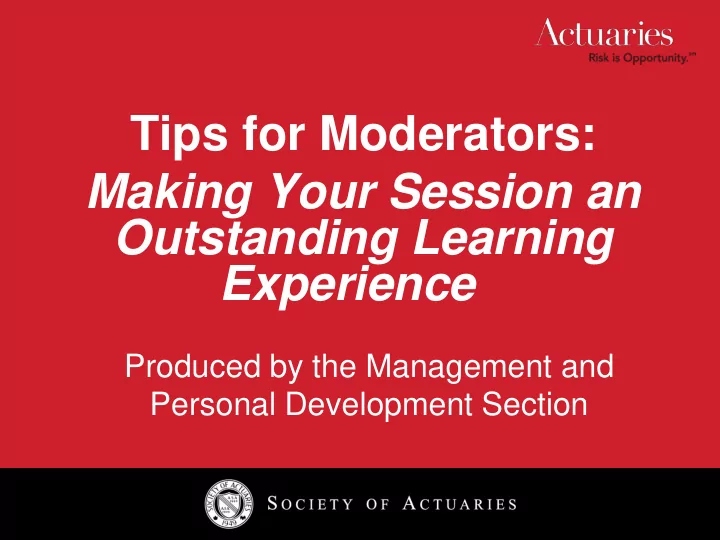

Tips for Moderators: Making Your Session an Outstanding Learning Experience Produced by the Management and Personal Development Section
Why This is Important Session participants attend to learn They want to feel that their time is well spent Presenters want to deliver their message to an engaged audience Increasing the level of interaction in sessions increases satisfaction People learn through multiple channels 2
People Learn: Read, Hear, See, Read, Experience, Hear, Practice See, Read, Experience Hear, See See Hear Read Learning Efficacy Effective moderators create the environment for participation and information exchange 3
Moderators Serve 4 Roles: Planner Stage-Setter Facilitator Time-Keeper 4
Planner 5
Moderator Role: Planner Successful sessions result from good planning Moderator may also be the session coordinator • Recruit speakers Consider recruiting 1-2 speakers rather than 3 • Fine tune session description and learning outcomes • Define the session approach 6
Moderator Role: Planner Working with presenters • Advance planning call with presenters Outline the agenda and coverage of topic Define how the session will flow • Meet presenters in advance • Have a “dry - run”; practice as often as possible Preparing your opening and closing remarks • You set the stage • Practice! 7
Stage Setter 8
Moderator Role: Stage-Setter The Moderator: Sets the tone for the session Provides context for the presentations Integrates the presentations for a cohesive and impactful message 9
Setting The Stage - Tone Arrive early Verify room logistics As people enter the room, welcome them! Set audience’s expectations for participation and questions 10
Setting the Stage - Context Introductory remarks before introducing the presenters: • Why is this issue important? • What relevance does it have to the actuarial profession? • How do the presentations fit together? Introduce the presenters: • Their background • Their expertise and fit relative to the topic 11
Facilitator 12
Moderator Role: Facilitator You have significant influence on the level of engagement and interaction: • Establish with presenters if and how they will interact with each other • Encourage presenters to take questions throughout rather than holding to the end 13
Moderator Role: Facilitator Help stimulate the interaction: • Ask the audience a question during your opening remarks • Be prepared to be the first questioner as presenters speak Ask a “novice” question • Call on people • Use real or hypothetical case studies (readable on screen) 14
Moderator Role: Facilitator Attendee participation: • Identify location of microphones • Provide index cards so participants can write- down questions • Play “pass the mike” (smaller groups) • Use “runners” and have written questions brought to the podium (larger groups) 15
Time-keeper 16
Moderator Role: Time-Keeper You keep the schedule on track • Set the schedule in advance Agreement with the presenters how to communicate • Have a time piece within easy view 17
Moderators Serve 4 Roles: Planner Stage-Setter Facilitator Time-Keeper 18
Resources 19
Recommend
More recommend